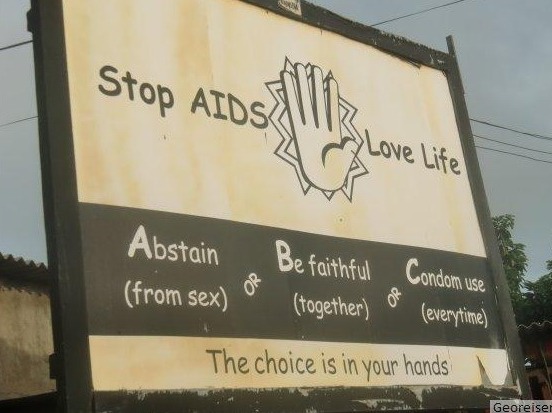 This hiv-prevention sign (from Ghana) offers three options: don’t have any sex at all, have it with only one other person forever or have the sex you want but use condoms. The choice is in your hands, meaning no authority figure is proclaiming which choice is right; you have to decide for yourself. I know some people dislike this ABC strategy because they don’t want abstinence to be there at all; I also know some critics think this approach neglects the realities of sex workers, gays and drug users. And I am sure some people dislike Love Life as smarmy. It’s a slogan, that’s all, and I put it here because it represents a humanistic way to think about sex and risk. Note that if you opt out of choosing, police are not mandated to force or rescue you from whatever you are doing.
This hiv-prevention sign (from Ghana) offers three options: don’t have any sex at all, have it with only one other person forever or have the sex you want but use condoms. The choice is in your hands, meaning no authority figure is proclaiming which choice is right; you have to decide for yourself. I know some people dislike this ABC strategy because they don’t want abstinence to be there at all; I also know some critics think this approach neglects the realities of sex workers, gays and drug users. And I am sure some people dislike Love Life as smarmy. It’s a slogan, that’s all, and I put it here because it represents a humanistic way to think about sex and risk. Note that if you opt out of choosing, police are not mandated to force or rescue you from whatever you are doing.
 I remember when I first heard about AIDS, in a radio news report in 1982, and I remember when public-health entities began to offer programmes to help reduce the spread of the virus. I don’t remember when I first heard the term harm reduction, but the approach seemed obviously right. I particularly recall when it was realised that many people who really needed them were not showing up at public clinics to get condoms and tests. This might be when I started to understand what margins mean. Going out to where people hung out, at times good for them rather than for health workers, was a breakthrough idea: Outreach. Haranguing people about their promiscuity or bad habits was understood to be useless. This pragmatic worldview was in the air. Disease prevention was the goal – avoiding human suffering if it could be avoided. Reducing harms.
I remember when I first heard about AIDS, in a radio news report in 1982, and I remember when public-health entities began to offer programmes to help reduce the spread of the virus. I don’t remember when I first heard the term harm reduction, but the approach seemed obviously right. I particularly recall when it was realised that many people who really needed them were not showing up at public clinics to get condoms and tests. This might be when I started to understand what margins mean. Going out to where people hung out, at times good for them rather than for health workers, was a breakthrough idea: Outreach. Haranguing people about their promiscuity or bad habits was understood to be useless. This pragmatic worldview was in the air. Disease prevention was the goal – avoiding human suffering if it could be avoided. Reducing harms.
This once obvious way to view illness, suffering, harm and risk has been eroding for some time. Now we hear about zero tolerance and other hard-line policies that prohibit people from behaviours considered wrong. To choose to take risks is often considered suspicious behaviour. My own tolerant ideas about migrants who undertake undocumented travel and jobs, particularly if they sell sex, gets me called amoral: apparently believing what people say themselves about their lives is the act of a heartless bitch. To me it all seems quite illogical.
For a long time mainstream policymakers were only interested in sex workers as disease-spreaders, so AIDS conferences were places where they were talked about, as objects. The question was How can we get them to practice safer sex? That is still of course the prevalent view amongst doctors, pharmaceutical companies and policymakers: stigma towards prostitutes dies very, very hard. But in the last decade or so the presence of sex workers at these conferences has significantly strengthened (bolstered by outside funding), and the events become sites of activism to promote human, sexual and workers’ rights, empowerment and protagonism in hiv prevention. This coincides with the opening up of a space for considering sex-work policy within the harm-reduction movement, which I first thought about when asked to speak at a conference in Portugal a few years ago.
Condoms are the obvious protection for everyone involved in commercial sex – right? That’s the harm-reduction approach. Yet in the US, where prostitution is prohibited, police can use the carrying of multiple condoms as proof that people are prostitutes and arrest them. The result? People don’t carry them. Human Rights Watch have called it harm-enhancement.
For the next week the International AIDS Conference is going on in Washington DC, and because US immigration policy is hostile to drug users and prostitutes – even when they are sponsored visitors spending the whole time in a conference venue – a lot of international participants won’t be there. An alternative event taking place in Kolkata, the Sex Workers’ Freedom Festival, is being attended by workers from dozens of countries. I had expected to go myself but finally couldn’t make it. Here is a calendar of events on sex work at both conferences, which will be video-linked for certain sessions. Good luck to all.
—Laura Agustín, the Naked Anthropologist

Pingback: Against Fundamentalism – Dr Laura Agustín on Migration, Trafficking and Sex « Asia Pacific Network of Sex Worker$
Hello Laura, do you have the original image in high resolution of the male prostitude with this article? I love that image!
Best regards, Bert